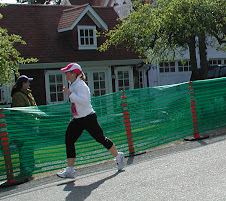Of course it made me think about how I don't foresee any PRs in my near (or perhaps distant) future, either. I think it's one of the myths people like to believe about running...that if you train regularly and try pretty hard you can keep improving and getting PRs. That's not necessarily true. You can run regularly, and do speed work, and not get laid up with an injury, and really try to run fast in races, and still just keep getting slower. Or get a little faster but not as fast as you once were. It's a roller coaster, really.
Some of the other things I've learned (that were a little surprising to me at the time)....
- You really have to run more than two or three miles before a run becomes enjoyable. Maybe it's just me, but the first two miles of a run are usually slow, awkward, and not fun. That's why I almost always do warm-up runs before a race. My warm-up distances are one (or two) miles for a half marathon, two miles for a 10K or similar distance, and three miles for a 5K. I don't do warm-ups for a marathon, generally, although I suspect it wouldn't hurt. When I was in high school I ran regularly (for off and on stretches of time), but I never did more than two, occasionally three miles at a time. I never liked running back then. But when I started running five or six miles, the endorphins kicked in, and I found out I really did like to run!
- Never say never. Any time I have said never again it has come back to bite me. For example...I'll never run over a two hour half marathon again. Um, yeah....I've been under and over more times than I can count. (I definitely do not intend to say I'll never run under a two hour half again!)
- You can run for about three hours before your body starts to break down. Again, at least for me. This is why 18 miles is my favorite long run distance. (Granted it usually takes more than three hours, but it's in the neighborhood.) I'm not saying that 18 miles or three hours doesn't hurt, but it's fairly easy to recover from.
- You run a lot slower on trails than on roads. That's normal. But if you run on trails a lot, your legs will adapt to that slower trail pace, and it might be hard to recover your road running pace. I'm sure trails build a lot of fitness in many ways, but they do nothing for speed.
- It's okay to walk. I'm not a run-walk person, generally speaking. If I'm running, I prefer not to walk (although I will stop as needed) and if I am walking, breaking into a run seems like the most impossible, awkward thing. But I have discovered that a judicious use of walking in some races (and especially in trail runs with a lot of difficult, hilly terrain) is not a bad thing. It's best, in my opinion, to put some structure around it (e.g., walk for a minute every mile), so that you don't end up walking and dread starting to run again (e.g., Honolulu Marathon).
- You can run faster in a race than in a training run, no matter how hard you try in the training run. I know, everyone already knows that. But it shocked me, in my early days of running 10Ks and half marathons, how I could take off and go faster than I thought I could. Even though that's abated a little bit--after running so many races, the race-day adrenaline is a little weaker--I can still usually find my git-up-and-go and pull out a decent finish time. (I said decent. Not great.)
- However, when you get to the marathon, most likely your marathon pace is not going to be all that much faster than your long run pace. I know that contradicts most every training recommendation to run your long runs 1-2 minutes slower than goal race pace. And maybe if you are a super fast talented runner that works. But almost invariably I have found that my marathon pace turns out to be only a little faster than my typical long run pace for that training cycle. (And if the marathon gets ugly, it might even be slower.)
- You can run 26.2 miles and live to tell the tale. I know, it shocked me too!






